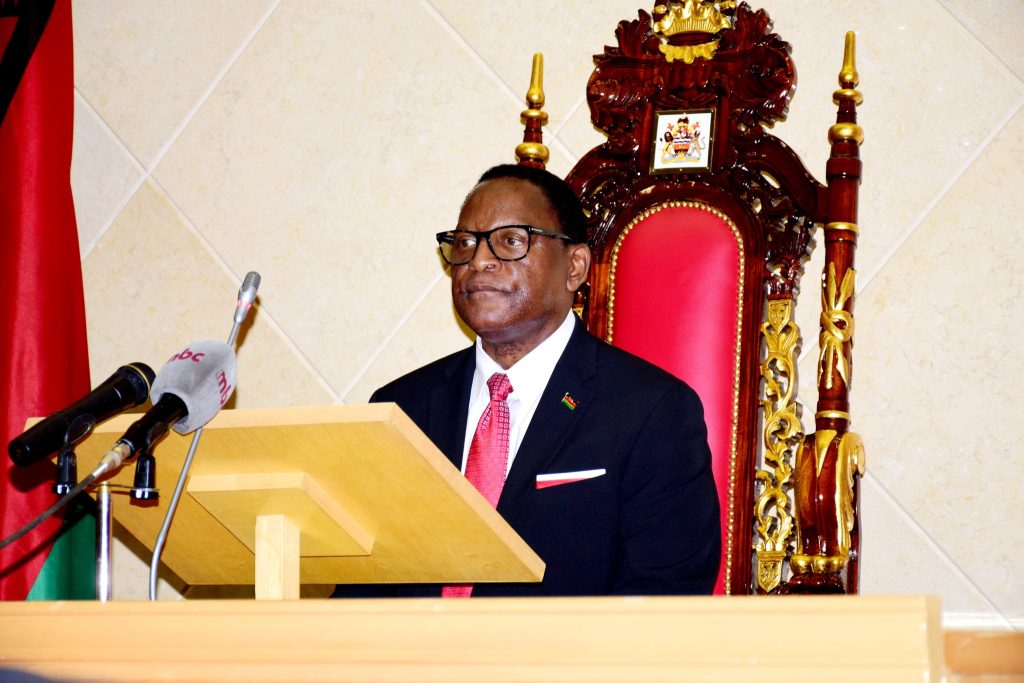Some key stakeholders have hailed President Lazarus Chakwera’s move to redesign the Affordable Inputs Programme (AIP) to make it more targeted and efficient in the next fiscal year.
Speaking on Friday during his State of the Nation Address (Sona) in Lilongwe, Chakwera said the redesigning of the programme was inevitable because after three years of implementation it has become evident that the challenges are enormous.
Chakwera speaking during his State of the Nation Address
The President cited ineffective targeting beneficiaries, high cost of farm inputs and delayed procurement as some of the challenges that have dogged the programme.
He said to address such challenges, the programme was undergoing reforms which will be effected in the new fiscal year to enhance its impact.
Said Chakwera: “The new design is necessary because despite the impact the programme has had on ensuring food security for millions, the Malawi Vulnerability Assessment Committee (Mvac) 2022 annual assessment estimated that over 3.8 million people in over 845 000 households may still not meet their food requirement during the 2022/23 consumption period.”
The 3.8 million represent about 20 percent of the country’s population that require humanitarian assistance during the 2022/23 lean season.
The objective of AIP, which had a budget of K109 billion in the 2022/23 National Budget, was to protect the most vulnerable Malawians from food insecurity.
Reacting to the announcement, Agriculture Committee of Parliament chairperson Sameer Suleman and an agricultural economist Henry Kankwamba applauded the move, which they said should have been done long ago.
But Suleman advised government to detach politics from the programme if the new design is to become valuable to needy Malawians.
Said Suleman: “While we approve that some mechanics need to be worked on in the programme there is need to take off politics. It is heavily politicised.
“The President talked of a redemption rate of 73 percent being achieved but I would have loved if that was broken down based on region, then you would understand what I am talking about [that the programme] is hugely politicised.”
Suleman said as opposition legislators and his committee, they were ready to assist in the redesigning of the programme to bring about the intended results for the benefit of all Malawians.
“AIP consumes the biggest chunk of agriculture national budget so it is every body’s wish to ensure that the programme achieves its goals.
“But we are pleading with government to be more approachable and make broader consultations so that at the end of the day we get the best that all Malawians deserve from the programme,” he said.
On his part, Kankwamba said the new design was a move in the right direction and something which was “supposed to have been done a long time ago.”
“One problem is and has been who gets targeted to be given AIP amongst the poorest of the poor? We need to have a clear programme that aims at social protection, a programme that will deal with the ultra-poor,” said Kankwamba, a lecturer at Lilongwe University of Agriculture and Natural Resources.
But Centre for Human, Rights and Rehabilitation executive director Michael Kaiyatsa has accused President Chakwera of not telling Malawians how and when the redesigning of the programme would be done.
“We had expected that the President would explain to Malawians the steps his government would take to address the recurrent challenges the AIP programme has been facing.
“As human rights organisations, we are deeply disappointed with the way the whole AIP has been implemented. It is also saddening to note that the President did not dwell much on AIP besides saying it will be redesigned, without explaining how that would be done or when. So, it’s really a missed opportunity on the part of the President,” said Kaiyatsa.
Chakwera said AIP has, as of Tuesday this week, achieved a redemption rate of 73.74 percent, just 1.5 percent shy of what it was at this point last year.
According to him, over 1.7 million households have already benefited having accessed about 182 425 metric tonnes (MT) of fertiliser and over 9 000 MT of cereal seeds.
“By category, this includes 2 006 705 bags or 100 335 metric tonnes of NPK, representing 81.12 percent, just 2 percent lower than it was at this time last year, 1 641 813 bags or 82 090 metric tonnes of Urea, representing 66.27 percent, less than 1 percent lower than it was at this time last year,” said the President.
He also said the farmers have accessed 1 786 326 packs or 8 931 MT of maize seed, representing 72.21 percent, higher than the 70.38 percent rate achieved at the same time last year and 125 440 packs of legume seed.
“So, even though there are still many vulnerable Malawians waiting to access the inputs they need, at the speed we are moving, I can assure them that help is on the way,” said Chakwera.
The post Chakwera gets applause on AIP reform first appeared on The Nation Online.
The post Chakwera gets applause on AIP reform appeared first on The Nation Online.
 Moni Malawi
Moni Malawi 

